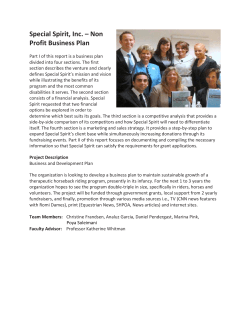
City Council, This is the money explanation I have
From: To: Cc: Subject: Date: Attachments: Mayor City Council Steve Ibbotson The Case for Spirit Homes II Tuesday, April 21, 2015 4:33:19 PM PARKS Spirit Homes - The Money Graph.docx image001.png image002.png image006.png image007.png image008.png image009.png City Council, This is the money explanation I have given to the various town hall meetings, to the full Chamber of Commerce Board of Directors, and to you. Here it is again in narrative and graph form. The purchase, development, and operating of Spirit Homes is simply “1, 2, 3, A,B,C” with the single addition of user fees. In the attached graph, you will find the expected 2015 City A&P Revenue budget. Please print the sheet out to accompany this narrative. NUMBER 1: Purchasing Spirit Homes To purchase Spirit Homes the city would use the portion of City A&P funds identified as Category “B” in the graph. These monies have been used the past five years to pay off the $3.5 million five-year financing for the completion of the Conway Expo & Fairgrounds. The final annual payment for the Expo was made in August of 2014. This money is free and clear for use towards other parks facilities in 2015 and beyond. Category “B” monies can again be used to five year finance the purchase of Spirit Homes. Using Category “B” monies alone to purchase Spirit Homes continues to leave $1,000,000 unallocated dollars a year for other parks projects (in the next two years.) This means the city can purchase Spirit Homes and no one would see any change in the way the city has been developing park facilities for the past five years. Remember, the city has built a $1.2 million dollar improvement to Curtis Walker Park just last year adding an ADA compatible ball field and playground, adding and modernizing parking facilities, and improving the pee wee football “stadium.” The city has also replaced and added new rest rooms at old parks, extended the Tucker Creek Trace (Trail) from Gatlin Park into Pompe Park under Prince Street to Adamsbrooke, started an entirely new trail system on Stone Dam Creek, and, in conjunction with the A&P Commission, built Rogers Plaza and added the new Arch entrance to downtown. All this has been added in the past five years while the city has been paying off the EXPO Center. The city can purchase and preserve the Spirit Homes opportunity with no curtailment of regular city park development. NUMBER 2: Developing of Spirit Homes To develop a First Phase of Spirit Homes the city can use Category “A” monies identified on the accompanying graph. Category “A” represents the current annual debt service the city pays every year to retire the debt of the 2007 parks bond issue. That issue can be rededicated this year. If the city rededicated this bond issue at today’s lower interests rates and added $500,000 from Category “C” the city would receive $15 million dollars in new money. This is money that could finance a first phase of the development of Spirit Homes. Two things. First, there are other methods to finance a first phase of Spirit Homes that I would hope the city would also consider. I will describe those options in another email. Second, I would not rededicate the bond issue this year for new money. The design portion of a first phase of Spirit Homes could take as long as six months to a year. I will forward to you a series of other projects which not only states a budget for those projects but the duration of design of the facilities. Including public input in the design phase will take some time. I would suggest let the bond issue continue to pay down the outstanding debt and let the A&P revenue continue to rise. When we are ready to rededicate with a public vote we’ll have less debt, potentially more bond sale proceeds, and a public fully on board with a design they help create. Hopefully, we’ll have less need for additional Category “C” monies. NUMBER 3: Operating Costs at Spirit Homes Operating costs at Spirit Homes will be largely born by user fees. If user fees are insufficient to cover operating costs, these user fees could be supplemented by Category “C” monies. I will present to you in forthcoming emails operating budgets of other facilities around the state that could mimic a First Phase of Spirit Homes development. All of these facilities charge user fees. These fees can be daily, monthly, yearly passes, or some even use 20 and 50 day pass options. They include single or family options. Daily rates are set anywhere from $3 a day to $5 a day. Yearly memberships are sold in some places. Free use days are even possible. For annual budget purposes some cities almost entirely cover their operations through user fees like Jacksonville and as the City of Bentonville projects for its new center. Other cities use other sources of revenue to supplement operating revenues such as a dedicated 1/8th cent sales tax in Clarksville. Other cities use general tax monies. Conway doesn’t wish to use General Fund revenues to fund operations at Spirit Homes. Therefore, user fees will have to be utilized. The development of Spirit Homes must also be made with an eye towards increasing both paid utilization of the facility and encouraging rentals of the facility. Close inspection of how cities like Jacksonville operate should be made to maximize revenue. Still, to the degree that user fees do not fully cover operations, Category “C” monies up to $500,000 can be utilized to plug the operational cost gap. Of course, we would not build any first phase that would not cover its expenses comfortably within the available NON General Funds monies. While this “Only A&P” option supplemented by user fees potentially absorbs all potential Category “C” monies in a worst case scenario, it is not to say we will stop building other parks. First, as I mentioned in my introductory email yesterday, the city will have between $3.4 million and probably $4.5 million dollars in revenue, above and beyond the first year’s cost of financing the purchase of Spirit Homes. All of this money can be used for OTHER parks. Second, at the end of five years the purchase of Spirit Homes will be paid off. The annual cost of financing Spirit Homes – around $750,000 annually – could then be used for other things such as a second phase of Spirit Homes or for constructing other park facilities. Third, the scenario above did not include any other parks source of revenue such as Park Impact Fees or Voluntary Property Tax Collections for the years 2015 through 2020. It also does not include any growth in A&P collections. Already 2015 A&P revenue to the city is up $119,000 for the first two months of the year. Even with a worst case scenario, the city can afford to buy, build, and operate a conceivable first phase for Spirit Homes while it continues to develop additional park facilities at the same time. 1, 2, 3, A, B, C. More is details are coming tomorrow with discussions concerning : how Conway can possibly have up to $4.5 million for OTHER parks in the next two years, how other cities operate park facilities that would mimic a first phase of Spirit Homes, and how other options exist for both development of different phases of Spirit Homes and for operating facilities located in Spirit Homes. Thank you for keeping an open mind! Tab Spirit Homes: Show Me the Money Using A&P Monies Only For the Purchase Development & Operating of Spirit Homes 2015 City A&P Revenue Allocation $2.85 Million 2015 A&P Revenue Budget A B C $1,050,000 Annual $800,000 $1,000,000 Parks Bond Issue Debt Service Annual Cost Expo Financing 2014 Unallocated $ 1,800,000 2015 Unallocated
© Copyright 2025









